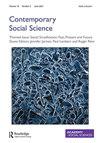Editorial: Contemporary social science open access (CSS open)
IF 3.9
Q1 SOCIAL SCIENCES, INTERDISCIPLINARY
引用次数: 0
Abstract
Welcome to this fifth issue of Volume 17, which is the third time we have run CSS Open, the completely open access (OA) issue of Contemporary Social Science. CSS Open has been an exciting development for the journal, both in terms of enabling more OA publishing and offering a ‘non-themed’ issue in addition to our usual special issues, made up of original research from disciplines across the social sciences. These OA online-only issues, published from 2020 onwards, have been developed in recognition of the shift taking place in publishing towards work which is open, accessible, impactful and inclusive. Many of these CSS Open papers have been widely read and highly cited, such as Breakwell (2020) on ‘Mistrust, uncertainty and health risks’, Van Der Zwet et al. (2020) on ‘Brexit, Europe and Othering’, Connolly et al. (2021) on ‘Governing ‘levelling-up’ in the UK: challenges and prospects’ and Grant and Kara (2021) on ‘Considering the Autistic advantage in qualitative research: the strengths of Autistic researchers’ amongst many others (with apologies to many other impactful CSS Open papers). All new non-themed OA articles are immediately added to a dedicated online-only issue, CSS Open, which enables all readers, everywhere, to find the latest open access articles in one place. Contributions to CSS Open are welcome in any appropriate form, including critical essays, reviews of significant topics, qualitative or quantitative empirical studies, including case studies and large-scale statistical analyses. Well documented examples of social science in action, composite reviews of sets of books and other publications are also welcome. Papers will normally be in the 5,000 to 7,000 word range.社论:当代社会科学开放获取(CSS open)
欢迎收看第17卷的第5期,这是我们第三次运行CSS Open,这是当代社会科学的完全开放获取(OA)期。CSS Open对该杂志来说是一个令人兴奋的发展,无论是在实现更多OA出版方面,还是在我们通常的特刊之外,提供一期“非主题”期刊,由社会科学学科的原创研究组成。这些仅限OA在线发布的问题,从2020年开始发布,是为了认识到出版向开放、可访问、有影响力和包容性的工作转变。许多CSS公开论文被广泛阅读和高度引用,如Breakwell(2020)关于“不信任、不确定性和健康风险”,Van Der Zwet等人(2020),关于“英国脱欧、欧洲和其他”,Connolly等人(2021)关于“英国的治理“升级:挑战和前景”,Grant和Kara(2021)讨论“在定性研究中考虑自闭症的优势:自闭症研究人员的优势”等(向许多其他有影响力的CSS公开论文道歉)。所有新的非主题OA文章都会立即添加到一个专门的在线期刊CSS Open中,该期刊使所有读者都能在一个地方找到最新的开放获取文章。欢迎以任何适当形式对CSS Open做出贡献,包括评论文章、重要主题评论、定性或定量实证研究,包括案例研究和大规模统计分析。也欢迎有充分记录的社会科学实例、成套书籍和其他出版物的综合评论。论文通常在5000到7000字的范围内。
本文章由计算机程序翻译,如有差异,请以英文原文为准。
求助全文
约1分钟内获得全文
求助全文
来源期刊

Contemporary Social Science
SOCIAL SCIENCES, INTERDISCIPLINARY-
CiteScore
6.40
自引率
8.30%
发文量
15
 求助内容:
求助内容: 应助结果提醒方式:
应助结果提醒方式:


